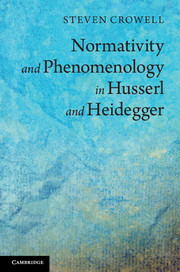Book contents
- Frontmatter
- Contents
- Acknowledgments
- Citation conventions for the works of Husserl and Heidegger
- Introduction
- Part I Transcendental philosophy, phenomenology, and normativity
- Part II Husserl on consciousness and intentionality
- Part III Heidegger, care, and reason
- Part IV Phenomenology and practical philosophy
- 11 The existential sources of normativity
- 12 Husserl and Heidegger on the intentionality of action
- 13 Heidegger on practical reasoning, morality, and agency
- References
- Index
11 - The existential sources of normativity
Published online by Cambridge University Press: 05 April 2013
- Frontmatter
- Contents
- Acknowledgments
- Citation conventions for the works of Husserl and Heidegger
- Introduction
- Part I Transcendental philosophy, phenomenology, and normativity
- Part II Husserl on consciousness and intentionality
- Part III Heidegger, care, and reason
- Part IV Phenomenology and practical philosophy
- 11 The existential sources of normativity
- 12 Husserl and Heidegger on the intentionality of action
- 13 Heidegger on practical reasoning, morality, and agency
- References
- Index
Summary
Existential Kantians: Heidegger and Korsgaard
In a recent criticism of Christine Korsgaard, Robert Pippin remarks that a central feature of post-Kantian German thought is the “exclusively practical, non-metaphysical status” it attributes to subjectivity (2003, p. 914). The transcendental tradition – represented here by Korsgaard’s Kant-inspired theory – rejects the metaphysical conception of the subject as a substance with certain fixed properties, arguing instead that subjectivity is an achievement, something at which I can succeed or fail. It is easy to see that Heidegger also belongs to this tradition, at least in Being and Time. There we read that “the ‘essence’ of [Dasein] lies in its ‘to be’” (GA 2, p. 56/42/67) and that Dasein is a “being for whom, in its being, that very being is an issue” (GA 2, pp. 16/12/32). For Korsgaard this non-metaphysical conception of subjectivity underlies an account of normativity, an explanation of how standards – including the standards that measure success or failure at being a subject – can bind you, can provide you with reasons for acting in some ways and with obligations that forbid you from acting in others (Korsgaard 1996b, p. 101). Her argument is complicated, but it turns on characterizing subjectivity as self-consciousness: normative concepts do not arise as answers to theoretical questions; rather they exist “because human beings have normative problems. And we have normative problems because we are self-conscious rational animals, capable of reflection about what we ought to believe and do” (1996b, p. 46). Self-consciousness thus gives rise to the normative, and the normative, “obligation … makes us human” (1996b, p. 5).
- Type
- Chapter
- Information
- Normativity and Phenomenology in Husserl and Heidegger , pp. 239 - 260Publisher: Cambridge University PressPrint publication year: 2013
- 2
- Cited by



